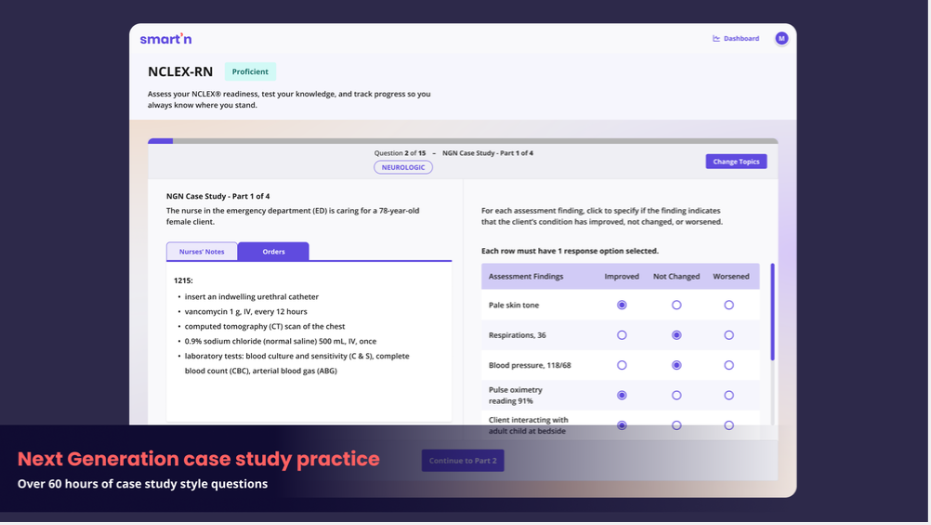How To Become A Wound Care Nurse In 2023? + Salary
Are you passionate about making a positive impact on the lives of patients by becoming a nurse while specializing in the field of wound care? If so, you may be intrigued by the prospect of becoming a wound care nurse.
In 2023, with advancements in healthcare and a growing emphasis on specialized care, the demand for wound care certified nurse is soaring. This comprehensive guide aims to provide you with valuable insights into the path to becoming a wound care nurse, the essential skills required, educational requirements, and the rewarding salary prospects that await you.
What is a wound care nurse?
The Wound Care Nurse, also known as the WOC nurse (Wound, Ostomy, or Continence nurse), possesses expertise in evaluating and managing skin damage and various types of wounds, with a particular focus on pressure ulcers. They frequently receive additional training in ostomy care and are often consulted when patients in hospitals develop wounds or pressure ulcers (bedsores) or require ostomy management. Their primary responsibility is to assess the condition of the patient's skin, develop appropriate treatment plans to facilitate healing, and consistently monitor the patient's skin health.
There are four main certifications available for wound care nurses:
Certified Wound Care Nurse (CWCN)
Certified Ostomies Care Nurse (CCON)
Certified Continence Care Nurse (CCCN)
Certified Wound Ostomy and Continence Nurse (CWOCN)
These certified nurses possess advanced knowledge and expertise in wound treatment and typically hold specialized positions in hospitals, nursing homes, and home health agencies. They are sought after for consultations regarding wound and ostomy management, provide direct care to patients, offer education to patients, families, and fellow nurses, and are responsible for overseeing wound care programs.
The Wound, Ostomy, and Continence Nursing Certification Board (WOCNCB) has successfully certified over 9,700 wound, ostomy, continence, and foot care nurses across the nation. However, it's important to note that passing the certification exam is a challenging task that demands determination, skills, and thorough preparation.
What do wound care nurses do?
Wound care nurses, being a specialized nursing discipline, collaborate with physicians as part of a consulting team to provide recommendations and follow-up care for patients. In addition, many wound care teams are responsible for developing and implementing policies related to wound care, ostomy management, and incontinence.
The roles and responsibilities of wound care nurses encompass various tasks, including:
Assessing and continuously monitoring wounds
Providing comprehensive care for patients with ostomies
Collaborating with other healthcare professionals to ensure holistic patient care
Ensuring accurate and thorough documentation for Medicare reimbursement purposes
Performing wound debridement, cleansing, and dressing
Educating patients and their caregivers on proper wound care techniques
Offering guidance on infection prevention and injury avoidance to patients and their caregivers
Providing education on pressure ulcer care and prevention
Administering prescribed antibiotics
Offering treatment and management for burn wounds
Providing diabetic foot care
Collaborating with the healthcare team to determine if additional treatments are necessary
Participating in discussions with the care team to assess the need for antibiotics, surgical interventions, or other treatments
Writing orders to promote wound healing and prevent skin breakdown
Overall, wound care nurses play a vital role in the comprehensive management of wounds, ostomies, and related conditions, working collaboratively with the healthcare team to provide optimal care for patients.
How to become a wound care nurse?
Becoming a wound care nurse requires a combination of rn wound care certification, education, experience, and specialized training. Here are the steps to pursue a career as a wound care nurse:
1- Obtain your nursing degree
Start by obtaining your nursing degree. The wound care specialty welcomes licensed practical nurses (LPNs), licensed vocational nurses (LVNs), and registered nurses (RNs) as potential candidates. To enroll in an LPN/LVN training program or an RN program, a high school diploma is required. It is recommended to have taken chemistry, biology, and mathematics courses during high school.
Various educational institutions, such as community colleges and technical schools, provide one-year programs for LVNs/LPNs. Some of these programs are also available online. Upon completion of an LVN/LPN program, students receive a vocational nursing diploma or a practical nursing diploma rather than a degree.
RNs have the option of graduating from either a two-year Associate Degree in Nursing (ADN) program or a four-year Bachelor of Science in Nursing (BSN) program. ADN programs are typically offered by community colleges, technical schools, and vocational colleges, while BSN programs are offered by traditional colleges and universities. Both ADN and BSN degree programs may also be available online.
2- Pass the National Council Licensure Examination for Registered Nurses (NCLEX-RN)
Successfully complete the National Council Licensure Examination for Registered Nurses (NCLEX-RN) to obtain your state licensure as a Registered Nurse (RN). It's important to note that eligibility criteria and requirements for the NCLEX-RN may differ across states, so it is crucial to acquaint yourself with the specific guidelines applicable in your state.
If you need help in the process of getting ready for the NCLEX exam, use an NCLEX study tool like Smart’n.
With Smart'n, you have the opportunity to utilize over 2,500 practice questions, including NextGen, along with clear explanations. This platform enables you to enhance your critical thinking and clinical judgment skills by engaging in NGN NCLEX-style case study practice.
Furthermore, you can monitor your progress, assess your knowledge level in each stage, and concentrate your studying efforts on areas that require the most improvement. By leveraging Smart'n, you can familiarize yourself with question formats and categories, optimizing your preparation for success.
3- Gain clinical experience
Begin working as a registered nurse in a healthcare setting such as hospitals, clinics, or long-term care facilities. This will provide you with valuable hands-on experience in various aspects of patient care, including wound management.
4- Pursue specialized education
Consider enrolling in specialized wound care courses or programs to enhance your knowledge and skills in wound management. Look for accredited programs that offer comprehensive wound care training and certification preparation.
5- Earn wound care certifications
Nursing programs typically do not provide extensive training in wound care techniques. Therefore, nurses who wish to specialize in this field are encouraged to pursue RN wound care certification.
While wound care nurse certificate may not be a requirement for securing a position as a wound care nurse, the comprehensive training received during the certification process can be immensely valuable. There are several recognized wound care certifications available, including:
Certified Wound Care Nurse (CWCN) certification
Administered by the Wound, Ostomy, and Continence Nursing Certification Board (WOCNCB), the CWCN certification requires a Bachelor of Science in Nursing (BSN) as a prerequisite. To be eligible for the exam, candidates must either have 1,500 hours of clinical wound care practice and 50 continuing education credits in the specialty or graduate from an accredited wound care management educational program recognized by WOCNCB. The CWCN exam comprises 120 multiple-choice questions, and the passing score is 500 or above. The exam fee is $395.
Certified Ostomy Care Nurse (COCN) certification
Also administered by WOCNCB, the COCN certification follows the same eligibility requirements as the CWCN certification. The exam consists of 120 multiple-choice questions, with a passing score of 500. The exam fee is $395.
Certified Continence Care Nurse (CCCN) certification
Also overseen by WOCNCB, the CCCN certification has the same eligibility requirements as the previously mentioned certifications. The CCCN exam is a written exam covering assessment and care planning (36%), intervention and treatment (37%), and education and referral (27%). The exam fee is $395.
Certified Wound Ostomy Nurse (CWON) certification
Like other WOCNCB certifications, the CWON certification has similar eligibility requirements. It includes 120 multiple-choice questions, and the exam fee is $395.
Certified Foot Care Nurse (CFCN) certification
To be eligible for the CFCN certification exam, candidates must hold a BSN, complete 24 continuing education credits in foot care, and have at least 40 hours of clinical experience in foot care. The CFCN exam consists of 110 multiple-choice questions, with a passing score of 70% or higher. The exam fee is $395, and it is administered by WOCNCB.
Wound Care Certified (WCC) certification
Administered by the National Alliance of Wound Care and Ostomy (NAWCC), this certification is open to LVNs, LPNs, RNs, physical therapists, physicians, physician assistants, and APRNs. Eligible candidates must have graduated from an approved wound care training course, possess four years of experience in the wound care field, or hold one of the aforementioned certifications. The WCC exam consists of 100 multiple-choice questions, and the application fee is $30, with an additional $330 exam fee.
Certified Wound Specialist (CWS) certification
Offered by the American Board of Wound Management, the CWS certification is available to RNs, physicians, podiatrists, and physical therapists with a minimum of three years of professional experience in wound management. The exam comprises 150 multiple-choice questions, and the passing score is 87 out of 125. The exam fee is $575.
These certifications provide nurses with specialized expertise in wound care and can greatly enhance their professional qualifications in the field.
How much does a wound care nurse make?
The typical salary for this nursing job is $36.28 per hour, $6,290 per month, or $75,464 annually. It usually takes about ten years of experience for wound care nurses to reach this salary level.
Registered nurses (RNs) specializing in wound care likely earn higher salaries than the average figure mentioned above. Wound care is a specialty that both RNs and LVNs/LPNs can pursue, so the average salary encompasses both categories of licensed nurses. However, LVN/LPN salaries tend to be 34% lower on average compared to RN salaries, with LVNs/LPNs earning around $46,282 annually and RNs earning around $70,335 . As a result, it is probable that the average salary for LVNs/LPNs in wound care is lower than that of their RN counterparts.
Conclusion
In conclusion, becoming a wound care nurse in 2023 requires dedication, specialized training, and a passion for patient care. By following the steps outlined in this guide, including obtaining the necessary education and pursuing wound care certifications, you can embark on a rewarding career in this specialized field.
FAQs
1- How can I be a good wound care nurse?
Acquire specialized knowledge
Obtain relevant certifications
Develop strong assessment skills
Foster effective communication
Prioritize patient education
Collaborate with interdisciplinary teams
Demonstrate attention to detail
Stay current on infection control practices
Show empathy and compassion
Maintain professionalism
2- What makes the best nurse?
Integrity and advocacy are fundamental strengths in nursing, characterized by a firm ethical foundation and a commitment to patient welfare. Nurses with integrity uphold honesty and make decisions that prioritize the best interests of their patients. Patient advocacy is a crucial aspect of nursing, as it involves standing up for and safeguarding the rights and well-being of patients who often rely on nurses in their vulnerable state.




